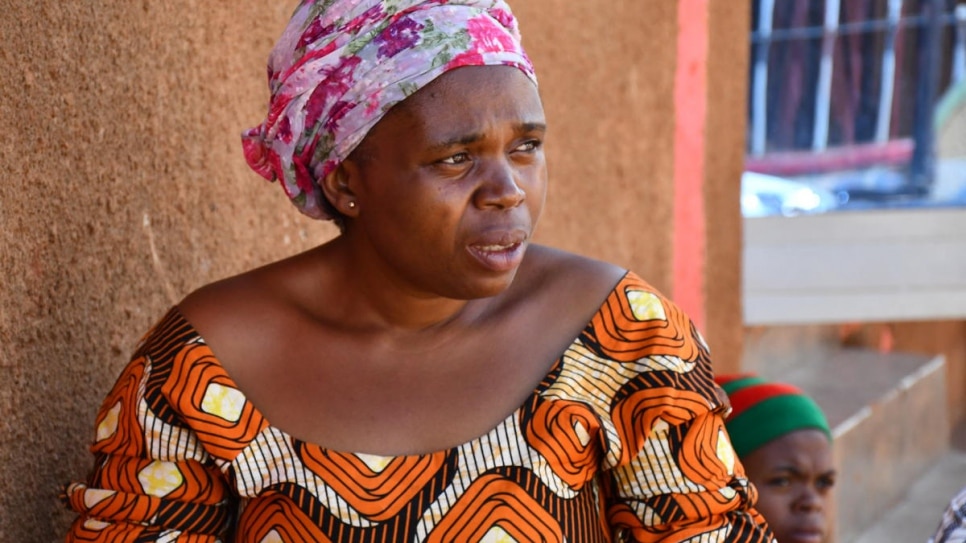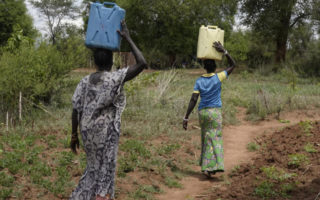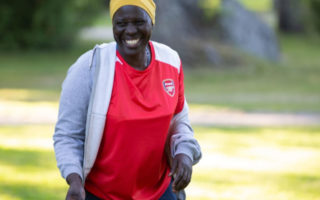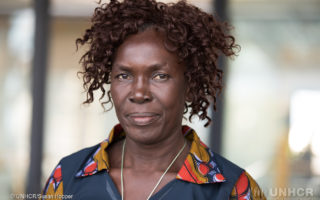
Mariney Karemere, 44, is a Congolese refugee living in Kampala, Uganda. © UNHCR/Duniya Aslam Khan
COVID-19 stay-at-home orders have taken a heavy toll on urban refugees, many of whom were struggling to get by in the informal economy before the pandemic hit.
Business was good at the start of this year for Mariney Karemere, a Congolese refugee who makes and sells handbags in Uganda’s capital, Kampala. Her customers were the daily commuters now absent from the once bustling markets shut down following a government lockdown aimed at slowing the spread of coronavirus.
Mariney went from making US$27 a week to no income at all, since the lockdown began two months ago. The 44-year-old single mother of three now survives on food handouts from a community church.
“Right now, the biggest worry for refugees is hunger,” she says. “If we go out, we risk contracting coronavirus. If we stay home, hunger will kill us. This is worse than a war.”
Uganda reported its first COVID-19 case in March and has since recorded over 260 cases. Income generating activities have been disrupted by restrictions on movement, suspension of transport, nighttime curfews and other preventive measures.
Vulnerable communities, including refugees whose incomes were already low, are some of the worst hit by the economic downturn.
“Our children are not going to school and they only eat once a day.”
Uganda hosts 1.4 million refugees – more than 80,000 of them live and work in Kampala, where they normally support themselves. Refugees who opt to live outside designated settlements are expected to be self-reliant and do not receive regular humanitarian assistance, in line with the government’s urban refugee policy.
Now, many urban refugees say they are not able to afford food and rent. In some places, they have mobilized resources to assist the most vulnerable among them.
Nujanama Nkomezi, a Congolese pastor and fish merchant, whose church is distributing food to some urban refugees, says everyone is worried about the future.
“Right now, landlords are not asking for rent but we worry what will happen once the lockdown is lifted,” he says. “How will we pay three-months’ rent in one go? Our children are not going to school and they only eat once a day.”
The government is distributing food through a support scheme for low-income households, but the needs are growing for local communities and refugees.
A World Food Program report says that about half of a sampled population of 212 refugees in Kampala lost over 75 per cent of household income. The proportion of households without an income earner increased from 31 per cent before the pandemic to 72 per cent at the time of the survey.
In response, UNHCR, the UN Refugee Agency, in Uganda will provide cash assistance to all registered urban refugees and asylum seekers in Kampala on an exceptional basis, to contribute towards rent and basic household needs including soap and masks.
Joel Boutroue, UNHCR’s Representative in Uganda said that UNHCR is seeking an additional US$5.1 million to fund this planned assistance to meet the urgent needs of urban refugees for the next three months.
“We are faced with an extraordinary situation where a health emergency is rapidly turning into a global humanitarian crisis like no other,” said Boutroue.
He added that the multi-layered emergency and ensuing containment measures are likely to have wide-ranging consequences on every sector, particularly, employment opportunities.
Global economic growth is likely to be halved by disruptions due to COVID-19, plunging 40 to 60 million more people into extreme poverty worldwide, according to projections by the Organisation for Economic Co-operation and the World Bank.
Worst affected will be those already living on the margins in low and middle-income countries where more than 85 per cent of the world’s refugees currently reside.
Originally published on UNHCR on 26 May 2020





